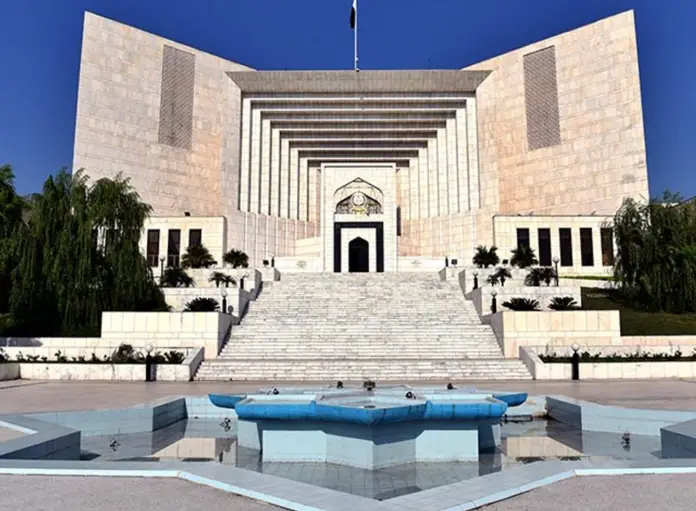Supreme Court of Pakistan has declared the ruling of the National Assembly deputy speaker wherein the no-confidence motion against the prime minister was rejected as unconstitutional.
The decision of the Supreme Court was a unanimous ruling by the five-member bench, which declared National Assembly Deputy Speaker Qasim Suri’s ruling to reject the no-confidence motion against Prime Minister Imran Khan as unconstitutional.
The Supreme Court has also declared the subsequent dissolution of the National Assembly by the president as unconstitutional, and that the prime minister was not in the legal right to write a letter to the president.
The Supreme Court also declared the advice to the president for dissolution of the National Assembly as unconstitutional.
The apex court has nullified all the decisions made till date since the NA deputy speaker’s ruling.
The Supreme Court has ordered National Assembly Speaker Asad Qaiser to call a session of the National Assembly on April 9 for voting on the no-confidence motion against Prime Minister Imran Khan.
The court further stated that if the no-confidence motion succeeded, then the assembly would appoint a new prime minister.
Supreme Court Chief Justice Umar Bandial had earlier said during the day that it was clear that the ruling of National Assembly deputy speaker Qasim Suri wherein he dismissed the no-confidence motion against Prime Minister Imran Khan was “erroneous”.
While hearing the case of the ruling of the NA deputy speaker today, Supreme Court Chief Justice Umar Ata Bandial said that the court would announce the verdict today and that the attorney general of Pakistan and the opposition’s counsel would assist the court in the future course of action in the national interest of Pakistan.
During the proceedings later in the day, the chief election commissioner stated that the Election Commission of Pakistan was ready to hold elections at any time. He added that because the delimitation process was yet to complete, it could take six to seven months to hold elections.
Meanwhile, local media reported that the attorney general has stated that the actions of Qasim Suri rejecting the no-confidence motion could not be defended.
Supreme Court Chief Justice Umar Ata Bandial observed that National Assembly (NA) Deputy Speaker Qasim Suri’s ruling was, on first impressions, a violation of Article 95.
The remark came during the hearing of National Assembly deputy speaker’s ruling case, as the Supreme Court resumed proceedings over the case for the fifth consecutive day today.
The apex court’s five-member larger bench – led by Justice Bandial and including Justice Muneeb Akhtar, Justice Ijazul Ahsan, Justice Mazhar Alam, and Justice Jamal Khan Mandokhel – is hearing the case.
Punjab Advocate General Azam Nazeer Tarar resumed his arguments and commented, “A dictator once said that the Constitution is a book of 10-12 pages, I can tear it at any time.”
“A very alarming situation took place in Punjab last night as Pakistan Muslim League-Nawaz leader Hamza Shahbaz was made Chief Minister,” Tarar said. He added that Hamza would take oath as the chief minister at Bagh-e-Jinnah, Lahore today. However, CJ Bandial rebuked Tarar saying that the court did not want to get into the province’s affairs, adding that the Lahore High Court would look into the matter.
Meanwhile, Justice Jamal Khan Mandokhel observed that even though National Assembly Deputy Speaker Qasim Suri announced the April 3 ruling, it was signed by Speaker Asad Qaiser instead of Suri himself. He made the observation as Suri and Qaiser’s lawyer, Naeem Bukhari, presented his arguments.
Bukhari argued that the apex court had refrained from interfering in parliamentary proceedings in the past. He inquired if the court would have taken notice if the speaker had dismissed Fawad Chaudhry’s point of order.







